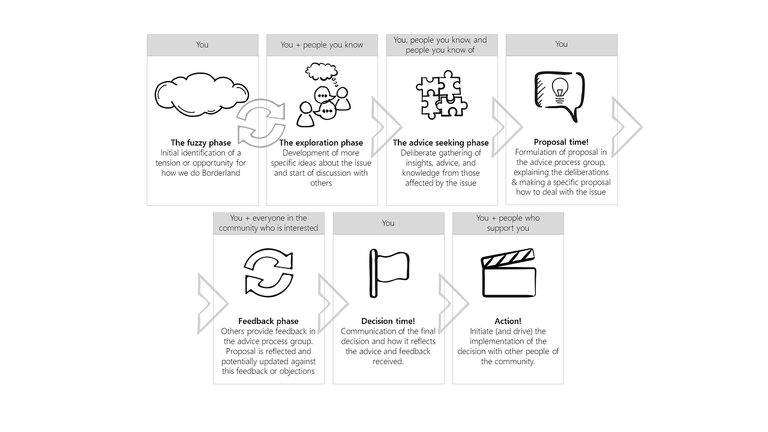Finding the Flow for the Splinterlands DAO
How can the DAO improve its proposal process?
The fact that we have a proposal system for our game is exciting for what we can achieve. The current SPS proposal system is a solid step toward decentralization and community governance, but it still has room to evolve. As it stands, proposals often only come to most people’s attention once they’ve entered the Pre-Proposal stage. By then, the timeline is short, and any feedback must be implemented quickly, if at all. There’s limited opportunity for iterative discussion, refining, or community buy-in before things progress to a final vote.
This post is to start a discussion that aims to improve the visibility, transparency, and collective wisdom behind proposals, helping us become a more responsive, thoughtful, and decentralized DAO. Some of these things already happen but are not visible to the majority of the community.
Inspiration: The Advice Process (from Borderlands)
I am a big believer in standing on the shoulders of giants. This idea is inspired by the Advice Process developed by Borderlands, a decentralized event based on Burning Man principles in Scandinavia. Their philosophy is simple: if you want to make something happen, you don’t need permission — but you do need to engage with those who will be affected and those with expertise.
It’s a bureaucracy of doing, not waiting. And it works well.
Not everything in the Advice Process applies to us, but there is a lot we can learn from it.
What Is the Advice Process?
The Advice Process encourages individuals to:
Identify a problem or opportunity
Talk to those affected by the decision
Talk to subject matter experts
Draft and share iterations publicly
Receive feedback early and often
Incorporate pros and cons, edge cases, and counterpoints
Ultimately, own the decision (but transparently)
The end result? A well-informed, widely discussed, and documented solution with better community alignment. At Borderlands, the person or group working on the proposal makes the decision. For Splinterlands, I see it going to a vote. Below is an image created to demonstrate the flow for Borderland's decisions.

Applying This to SPS Proposals
I propose the DAO trial a similar multi-stage proposal process and try to bring more visibility and discussion to proposals.
To illustrate how this system works, we can run proposals through this advice-style flow, even before it's adopted formally. This will help us observe what works and what needs adjusting for our DAO.
During this time, we could develop resources like templates or a support network to help guide people through the process.
This process should be treated as a living system; it can and should be revised over time or as needed
I feel a lot of our community don't realise we are also members of the DAO, not just the team. If we want to see changes, we can make it happen!
Why This Matters
Better proposals: More informed, more balanced, fewer blind spots, more likely to pass.
More engagement: People feel involved and heard earlier in the process.
Shared understanding: Everyone sees the “why” behind proposals, even the ones they disagree with.
Transparency & record-keeping: Discussions and iterations are documented and easy to revisit.
Going Forward
I don't think all proposals should go through this process while it is being worked on. But where possible, we should try.
1. Early Discovery & Framing
A simple Hive post, forum thread, or Discord discussion where someone outlines:
The opportunity or problem
- Problem or Opportunity
- Initial thoughts
- Who they plan to talk to next
- What kind of feedback are they seeking
This sparks early engagement.
2. Community Feedback Rounds
Encourage people to:
- Share what technical information they have
- Explain how the idea impacts different groups (whales, minnows, landowners, renters, validators, etc.)
- Share alternatives or refinements
This stage could play out over Hive posts, Discord, and even DAO calls, where ideas are pitched and openly discussed live.
3. Iterative Refinement
The proposer refines the idea based on feedback and creates a more structured draft proposal. At this point, it’s been informed by:
- Tech feasibility
- Economic modeling
- Community sentiment
- DAO principles
This stage can even include polls if there are multiple ideas or to gauge if the community supports the proposal in its current form
4. Pre-Proposal & Formal Review
Only after going through the above does the idea enter the current on-chain Pre-Proposal stage — but now, it arrives with way more clarity and support.
If it fails at any voting stages, then the proposal can go back and follow the above steps to see fit can be refined enough to be passed.
Can you help?
Absolutely. Giving feedback is supremely helpful!
- What changes to the proposal system would you like to see?
- What do you like about the outlined trial, or what worries you about it?
- Do you have a proposal you'd like to trial with this framework?
- What are the big opportunities or problems you see in the Splinterverse?
- What would get you more engaged in the decisions for the DAO
- Anything else you'd like to share that might be relevant?
Watch this space
Over the next few weeks I will be posting proposal ideas using this format, and I'd love your input on those as well!
Final Thoughts
This proposal isn’t saying “here’s the one way we must do it” — it’s offering a framework we can test, iterate, and improve. Our governance process deserves to be as dynamic and decentralized as the game ecosystem we’re building.
Let’s find our flow — and make our DAO even stronger together.